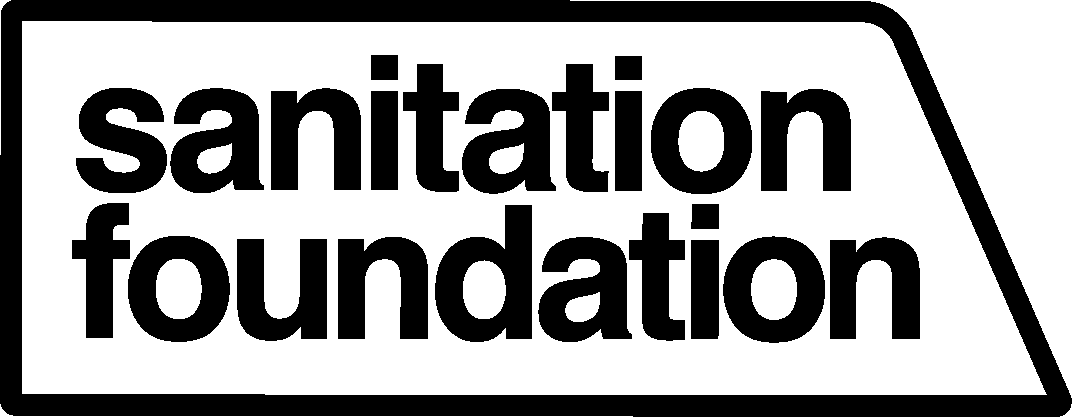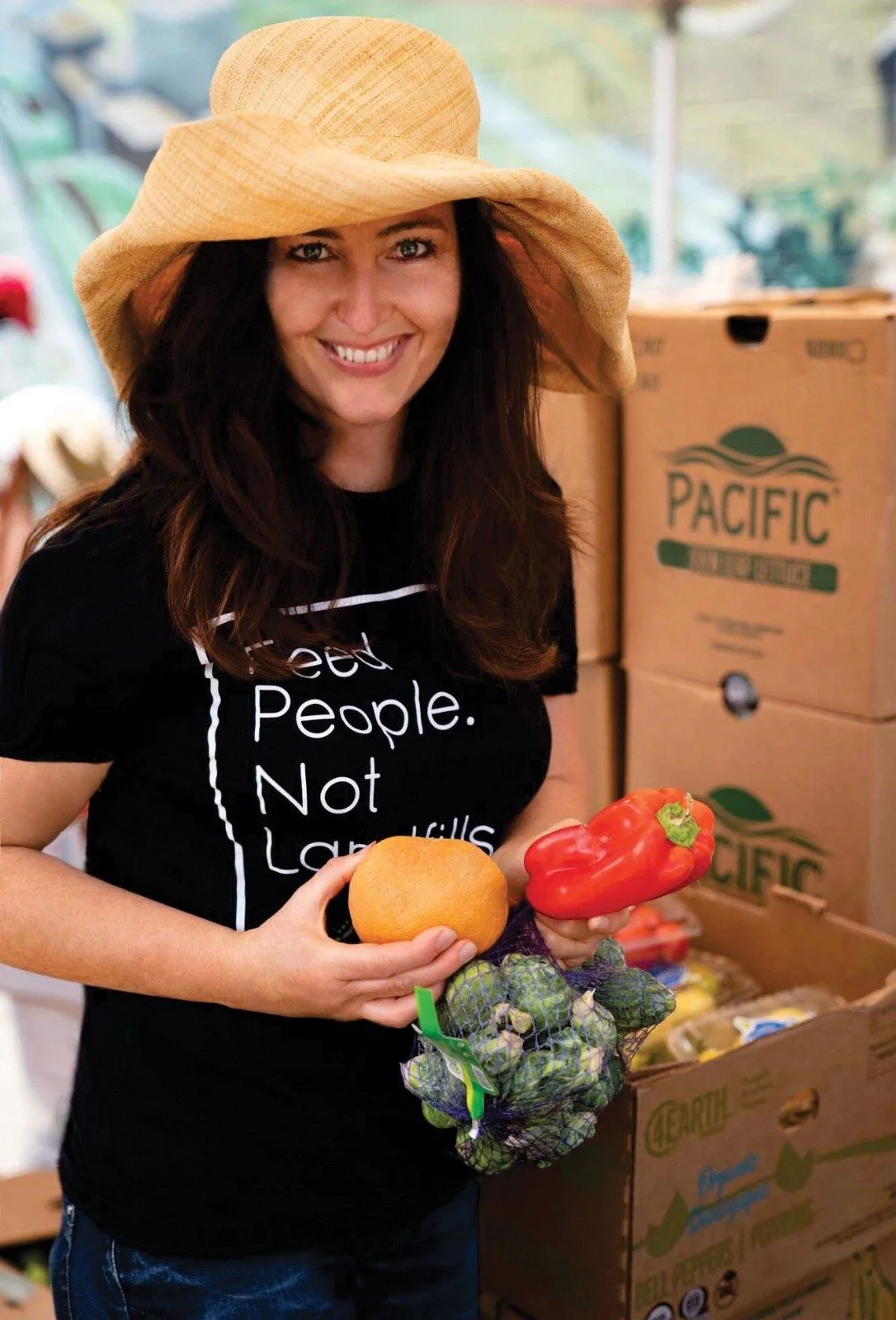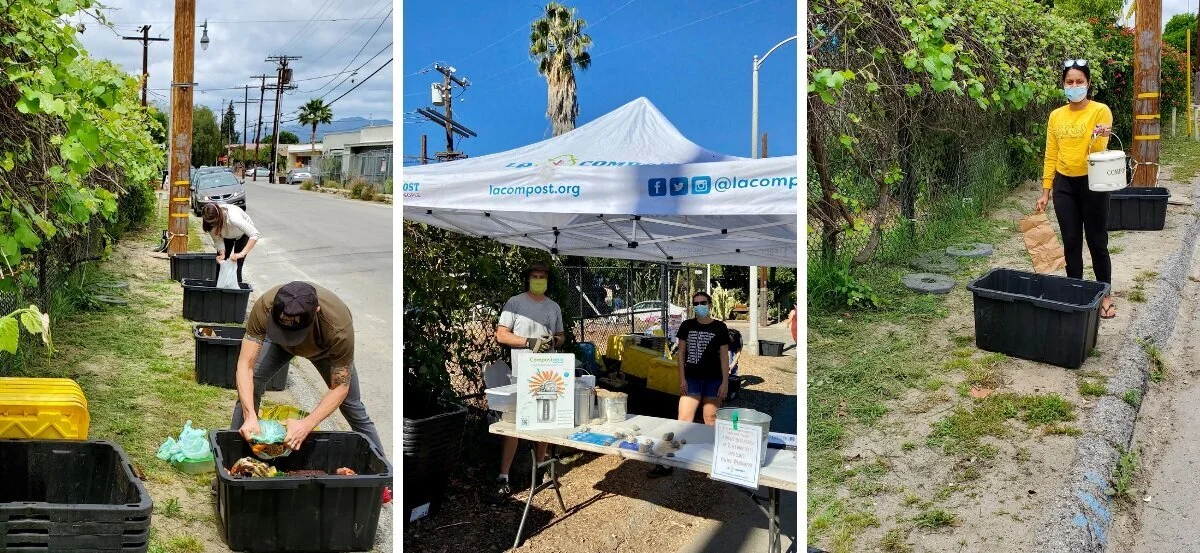Grassroots Solutions to Food Waste in Los Angeles
With the Food Waste Fair coming up this June, the Sanitation Foundation’s blog will feature ways to prevent and reduce food waste.
By: Sophia Wu
New York City is not alone in grappling with issues of food waste and food scarcity. Los Angeles, second to New York City in population size, is home to the largest number of food insecure people in the country, and yet discarded food is the largest waste stream feeding local landfills. In this Sanitation Foundation blog post, we’re featuring a guest writer from Los Angeles who will share with us how the city is tackling these issues from the ground up.
The state of food waste and food scarcity in Los Angeles
According to the Los Angeles Food Policy Council, over one million tons of food enters Los Angeles’s landfills every year and yet, nearly thirty percent of low-income individuals in the county struggle with food insecurity. Tackling this massive problem in a sprawling city like Los Angeles requires a network of solutions that address each aspect of the food waste cycle: generation of food waste, public behavior, and compost. Read on to learn about the community-based solutions pioneered by conscious citizens that have filled in the gaps left behind by large waste haulers and municipal initiatives.
Tackling food waste generation
Of the many reasons why food is deemed waste, and perhaps one of the most incomprehensible, is the cosmetic rationale. Whether the tendency to avoid dented apples is innate to consumers or is a habit that supermarkets have cultivated in us, the result is tens of billions of pounds of “imperfect” food being thrown out of grocery stores every year. FoodCycleLA is one of the many organizations in the county working to flip the notion of ugly food on its head.
FoodCycleLA’s pithy mission statement is “Feed people, not landfills.” This food recovery nonprofit leverages technology and logistics to map out food retailers and hunger relief organizations in LA in order to efficiently route excess food to food deserts. Their partners include a wide range of retailers, from Trader Joe’s, Whole Foods and Sprouts to Noah’s Bagels and MoonJuice. Retailers participate for the benefits of convenient diversion of food waste and the opportunity to earn tax incentives, while over 160 nonprofit partners receive fresh, healthy food for the people they serve.
While FoodCycleLA’s strategy and mission are impressive, I was most inspired by the effort of the staff and volunteers. One day last month, my partner told me about a free food distribution that was happening in his apartment complex. Intrigued and happy to accept some free produce, I decided to join him at the distribution. Upon arrival, I was surprised to see the FoodCycleLA truck, the same one that I happened to spot outside a Trader Joe’s months ago. A socially-distanced line of reusable bag-carrying neighbors had formed, and one by one, we filled our bags from the line of boxes of dented cans of black beans, leftover sourdough loaves and croissants, overstocked bananas and more.
Martina Gallagher, FoodCycleLA’s Outreach and Westside Operations Manager, runs the distributions at the apartment complex in partnership with the non-profit A Call 2 Peace Foundation. I spoke with her to learn more about how she came to join the FoodCycle team and why she distributes to a residential community. Martina is a health coach and has two young sons, and when she noticed that her sons were consistently bringing back unhealthy foods from school, she decided something needed to change. She soon found out that food providers like Le Pain Quotidien, a bakery chain, donate leftover food at the end of the day, so she proceeded to build a relationship with the bakery and deliver baked goods to her sons’ school twice a week. Martina and FoodCycle crossed paths during FoodCycle’s expansion period, when they had just started to partner with bakeries like Le Pain Quotidien. Since joining the team, Martina has played a key role in growing FoodCycle, channeling her entrepreneurial spirit and passion for feeding people into successes like establishing FoodCycle’s first partnership with Trader Joe’s. “At that point,” Martina said, “I didn’t even have a business card, I didn’t even know who to talk to, I’d just walk in. But I had a lot of passion, and I think that’s what started convincing people.”
Martina explained that while FoodCycle typically distributes to nonprofits and hunger relief organizations, as a resident of our apartment complex, she knew that there were neighbors in need of food. “When I started distributing, I started to hear stories of not just single parents but families with kids, elderly folks or others who had just lost their jobs,” she said, “and when I talked to the apartment management, I learned that many people were not paying their rent because they simply couldn’t. So food distribution is a welcome break. They at least don’t have to spend money on groceries.” Martina’s concern for the wellbeing of her neighbors has moved her to support hundreds of them in our apartment complex and thousands across Los Angeles.
This sentiment of caring deeply for the health of others is what knits together the network of food recovery support in the city. Since the start of the pandemic, FoodCycleLA has recovered 2.6 million pounds of food to put on the plates of hungry Angelenos.
Educating Angelenos about food waste
In our globalized, efficiency-focused system of food production, the knowledge of how our food is produced, where it is transported from, and how it breaks down in our environments is a powerful tool that people can use to build a healthier food system. Food waste curricula often do not make it into traditional educational spaces like K-12 schools, and busy adults often do not have the time to think about the methane gas that their half-eaten burger will emit as it sits in a landfill. LA Compost is working to bridge this educational gap and educate Angelenos about their food.
LA Compost is a community-based nonprofit that operates over thirty decentralized community compost hubs across LA County. Megan Laird, LA Compost’s Development Manager, explained to me that the nonprofit “envisions using a biomimicry framework, with our decentralized human network of compost contributors resembling the vast network of soil microorganisms which foundationally support all living systems.” To reach a wide range of Angelenos and “disrupt the urban environment’s obstacles to community climate resilience,” LA Compost organizes several different programs at different scales. These include the Soil Farmer Program which recruits community residents to work with LA Compost staff to design innovative soil enhancement projects and improve the use of green spaces in their neighborhoods, and the Compost Cultivator Volunteer Training Program, a 5-month long program where participants learn community compost management and maintenance best practices at the household, neighborhood and regional level.
In LA, as is the case across the US, inadequate access to healthy food is linked with environmental, social and economic inequities that disproportionately impact low-income communities and communities of color. These communities are often the most at-risk for environmental racism, which can appear in the form of aggregated toxic air pollution due to urban development of highways and landfills, and food desert conditions. A recent study found that in the entire South LA region (consisting of 25 neighborhoods), there were merely 7 supermarkets. LA Compost combats this by strategically building healthy food networks in the places that need it most — two thirds of their existing community-level compost hubs operate within low-income neighborhoods of color, Megan said. LA Compost has also distributed thousands of fruit and vegetable seedlings for home and community garden growing during their programs in collaboration with Farming for a Future.
Founded by Michael Martinez, a Los Angeles native who grew up watching his parents tend to the fruit trees in his backyard, LA Compost lives by three principles: Conocer (to know), Compartir (to share and participate), and Co-crear (to co-create). In 2020, the team diverted 739,050 total pounds of organics from landfills, welcomed 616 new compost hub members, and opened 7 new compost drop-off locations with the potential to serve nearly 500 additional households. By creating spaces for Angelenos to reconnect to their food and to the natural world, LA Compost strives to engage individuals around the significance of compost and utilize communities’ contextual and cultural knowledge to design compost solutions that work for them.
Closing the loop
The final step in the food waste cycle involves returning food waste into the natural food cycle through composting. Although municipal waste haulers have the capacity to divert and compost an enormous amount of food waste, this solution leaves considerations of environmental justice and food sovereignty out of the picture. Is food waste being converted into energy or soil? Are organic waste digesters more often located in low-income neighborhoods? These are the questions that Monique Figueiredo pondered when she founded CompostableLA.
In June 2019, Monique, a self-described compost activist, started CompostableLA, a compost pick-up service operating in greater Los Angeles. CompostableLA’s mission is to “close the loop in our food systems by turning former waste into future nutrients.” Monique and her co-owner, Jamie Renee Williams, hope to do so while centering on restorative justice and community self-reliance. Upon subscription to the compost pickup service, members are provided with a 4-gallon sealable bin for their food scraps. On pickup days, the Compostable team swaps out members’ full bins of compost for clean bins and transports the food scraps to a partner farm, typically the Cottonwood Urban Farm. Twice a year, members are invited to the Cottonwood Urban Farm to take part in or observe the composting process and take home compost if they choose to.
I caught up with Monique to chat about why she started CompostableLA and what her driving philosophy is. After moving to LA from Boston, Monique quickly found that even as a committed composter, it was incredibly difficult for her to compost at home with limited space or drive to a drop off site (her neighborhood is tucked away and separated from much of the rest of the city). A compost pickup service didn’t exist at the time, so the idea for one began brewing while Monique was completing a certificate for sustainability at UCLA. With the help of friends and teachers, she launched CompostableLA. Monique is guided by the Institute for Local Self-Resilience’s Hierarchy to Reduce Food Waste & Grow Community: “I like to think about not just diversion, but environmental justice and healthy soil creation. I want food waste made into soil, and I want that soil to benefit the community that created that soil, not trucked away and never seen again,” she said.
In the beginning, Monique was sharing photos to Instagram of herself in her hatchback full of compost bins, from the cargo area to the front seat. Now, she and Jamie work with a team of five staff to serve all of LA’s westside, eastside and valley regions. To date, CompostableLA has diverted over 87,000 pounds of organic material, all of which has been returned to feed soil and distributed through communities. Through the collaborative efforts of CompostableLA's pickup service and LA Compost's drop-off hubs, CompostableLA’s members have composted over 739,050 pounds in 2020 alone.
Echoing the neighborhood-based mutual aid networks in New York City, community-based movements in Los Angeles have not only provided Angelenos with healthy food, economic opportunity, and soil regeneration, but have also built a community of passionate advocates who see to it that people are fed and communities are uplifted, all while healing our planet.



